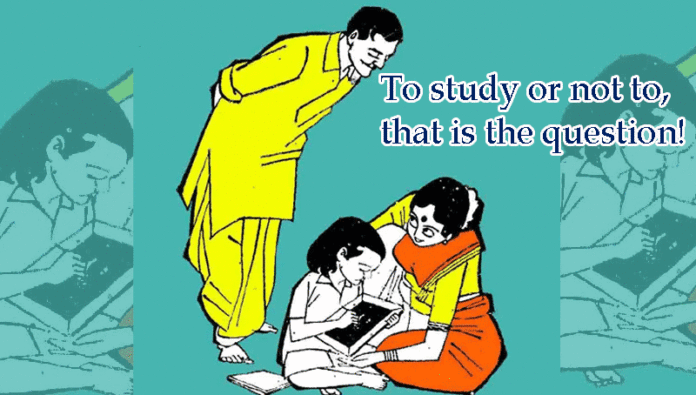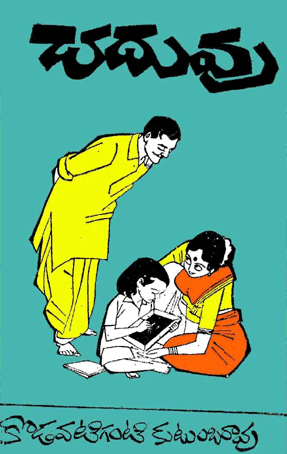Throughout history one common trait across the Indian subcontinent irrespective of socio-economic hardships is a reverence for education. Even today education is the only morsel of hope for countless Indians. However in our case it is a hope which borders on paranoia. The latter part of Rudyard Kipling’s timeless words “If you can dream and not make dreams your master “ sum up our educational expectations and aspirations. Across the seas of time several Indian students have been acting as a noah’s arc for ferrying their parent’s dreams and aspirations through the dangerous currents of hardship and adversity. In conveying these situations kodavatiganti kutumbarao’s “Chaduvu” stands tall as a seminal work in understanding the misunderstood and misused role of education in Indian society.
The novel deals with the evolving psychological state and internal dialogue of a middle class person called Sundaram in the context of an ever changing yet static Indian society amidst the looming currents of world wars and our own freedom struggle. However the crux of this story lies in the relationship between a mother (seetamma) and her son. Sundaram’s mother wants her son to enjoy the process of studying. Her fears rest in the fact that every other person in her neighborhood view education either as a compulsion or as a means to an end , she loathes this notion and wants her kid to enjoy the process of study as she could never experience the fruits of education firsthand. Kutumbarao beautifully portrays the fear of a mother in sending her kid to school. Once our protagonist Sundaram is in school he is already preprogrammed with the ideals of an optimist who loves the process of learning. Contrary to his expectations , the reality of school life shatters the youngling. Strict and condescending teachers , heckling peers and rote memorisation is what troubles Sundaram. This moment sharpens our protagonist’s ability to see through the cracks in our social institutions. However this story is anything but sad and gloomy. The reader is instantly transported to a world that is different yet very similar to our own. Its ultimate triumph lies in describing the overflowing life in 1900s British India . Right from the descriptions of theatre plays of legendary stalwarts to the colourful parades of the Indian National Congress , we are in the shoes of our protagonist Sundaram. After completing the 180 pages we get a feeling of having lived a complete life.
But the one aspect of this book that alone makes it worth reading is the evolution of the relationship between the mother and her son. The story begins with a kid pestering his mother to teach him the Telugu alphabets. We see the joy in the mother’s face while she watches her son learn. This happy duo’s dynamic eventually reaches a state where the son thinks it a bother to talk to his mom and views her like a responsibility. By the time Sundaram turns into an adult there is no common ground between the mother and the son to talk about other than the dull and drab aspects of debt and financial obligations. Although the initial seed of our lead’s educational interests were sown by his mother herself , the irony is in the fact that Sundaram fulfilled his mother’s desire while she got lost in the chaos that is life. Unfazed by the financial problems and traditions around him Sundaram’s plunge into the enticing world of ideas and ideals costs him dearly as he is incompetent at everything other than reading relentlessly and feeling sorry about the ills of society. By the end of the novel we are prickled with the age old question , “ what good is education if it can’t help you feed yourself and your family ? “ . However , Kutumbarao does one better by making our protagonist enjoy the process of education even in the face of problems. His escapades and ventures into the heartland of our country during the freedom movement while his own family is neck-deep in debt feels tragic and adventurous at the same time .
A disdain for conformity , a love for adventure , longing for exploration and creativity are traits inherent to mankind. But the beauty of this story is in packing all these traits in a self aware middle class person who is burdened by financial constraints. As a result of this character design , it is a joy to plough through the pages as we see how education can prove to be detrimental for practical purposes but stimulating for severe intellectual daydreaming which puts no dent in the universe but has its own utility in enjoying life. Since this work is a tale which provides no easy answers but presents a life as it might have been in those days through the eyes of an idealist, we the readers can enjoy the complexity , confusion and beauty of life itself through the authors intentionally simple yet thematically complex work.
“ Chaduvu “ in telugu has two meanings : one is “study” which in its noun form refers to the process of acquiring knowledge and the other in its verb form alludes to keep studying. Kodavatiganti kutumbarao’s descriptions and inner monologues of his lead character are so full of life that the reader is forced to study and keep studying his works. In some ways this novel almost feels like a Dostoevsky novel with its narrator, social commentary and timelessness while also being a 100 percent Telugu story with the brimming of life and an optimistic view of the human experience that is the hallmark of Telugu literature and thought.
-Pamidikalva Sujay
sujaypamidikalva@gmail.com




